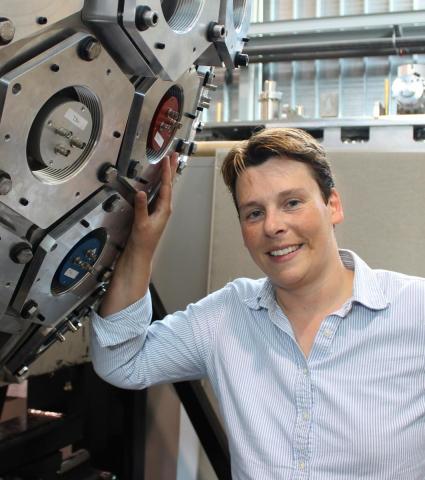
On June 26, 2014, the Natural Sciences and Engineering Research Council of Canada (NSERC) announced the competition results of the 2014 Discovery Grants, Discovery Accelerator Supplements, as well as other fellowships and scholarships. Iris Dillmann, a research scientist at TRIUMF, was awarded a five-year Individual Discovery Grant to support her research of neutron-rich exotic isotopes titled “Beta-delayed neutron measurements for nuclear astrophysics.”
Iris came to TRIUMF as a group leader of a prestigious Helmholtz Young Investigators Group from Germany in 2013 to continue her research of neutron-rich nuclides. “There’s so much still to be discovered on the neutron-rich side in the coming years, whether it is the measurement of the half-lives or masses, nuclear spectroscopy or exotic decay modes like beta-delayed neutron emission,” Iris explains.
Additionally, Iris was one of the few Canadian applicants who were also awarded a Discovery Accelerator Supplement (DAS). As noted on the NSERC website, the DAS Program awards substantial resources to researchers who have a superior research program that is regarded highly in terms of originality and innovation, and who show strong potential to become international leaders within their field. These additional resources should enable a researcher with an established research program to capitalize on an opportunity (e.g., a recent research breakthrough, a paradigm shift, or a new strategy to tackle a scientific problem or research question, etc.). Each award is valued at $120,000 over three years and provides recipients with additional resources to compete with the best in the world.
Reiner Kruecken, Science Division Head, commented: “TRIUMF can consider itself fortunate to have attracted a young researcher of Iris’s caliber to Canada. Iris already has a visible impact on the ISAC program and is carrying out a highly visible research program at other world-leading facilities. I am very happy that the NSERC Subatomic Physics Evaluation Section recognized her achievements and potential by awarding her with the DAS.”
TRIUMF uses the so-called Isotope Separation Online (ISOL) method for the production of rare isotope beams at its existing ISAC facility, the world’s highest power ISOL facility. The new ARIEL project will extend the reach towards even more neutron-rich nuclei. The investigation of these nuclei at (and beyond) the present border of the chart of nuclides will be pursued by Iris and her collaborators in complementary experiments at TRIUMF as well as the next-generation of fragmentation facilities like FRIB in the USA, FAIR in Germany or the already running RIBF at RIKEN in Japan.
Iris will help to push the ISAC science program at TRIUMF to explore more neutron-rich isotopes that can now be produced in sufficient quantities and purity from actinide targets. Her in house-program will include measurements with the newly commissioned GRIFFIN spectrometer and the neutron detector DESCANT. However, a fraction of her time will also be spent outside of Canada. In November, Iris will carry out a measurement with the BELEN neutron detector at the IGISOL facility in Finland. Soon after, Iris and her collaborators will merge several neutron detectors into one large, world-leading device called “BRIKEN” to carry out measurements at RIKEN in Japan.
Iris will bring on board one postdoctoral fellow from Spain, Roger Caballero, to join her efforts as she explores these topics at TRIUMF and at RIKEN in Japan.
With the Discovery Grant and Accelerator Supplement, Iris and her team will investigate beta-delayed neutron emitters for nuclear astrophysics. The main purpose of her research aims to get a deeper understanding how elements are created during the rapid neutron capture process––the process responsible for the creation of 50% of the elements heavier than iron.
Photo: Iris standing next to the DESCANT neutron detector in the ISAC-II hall
Congratulations, Iris!
For more: http://www.nserc-crsng.gc.ca/Professors-Professeurs/Grants-Subs/DGAS-SGSA_eng.asp
-Melissa Baluk, Communications Coordinator
